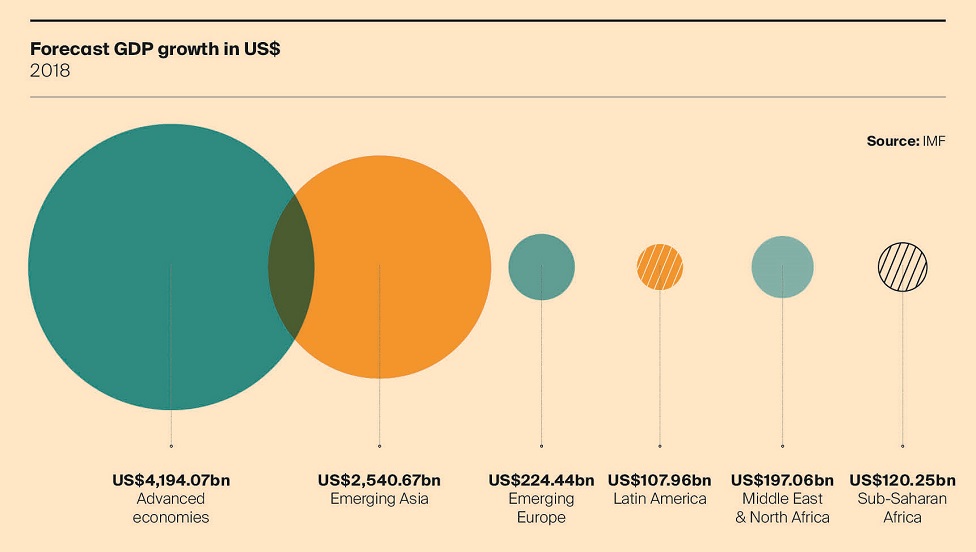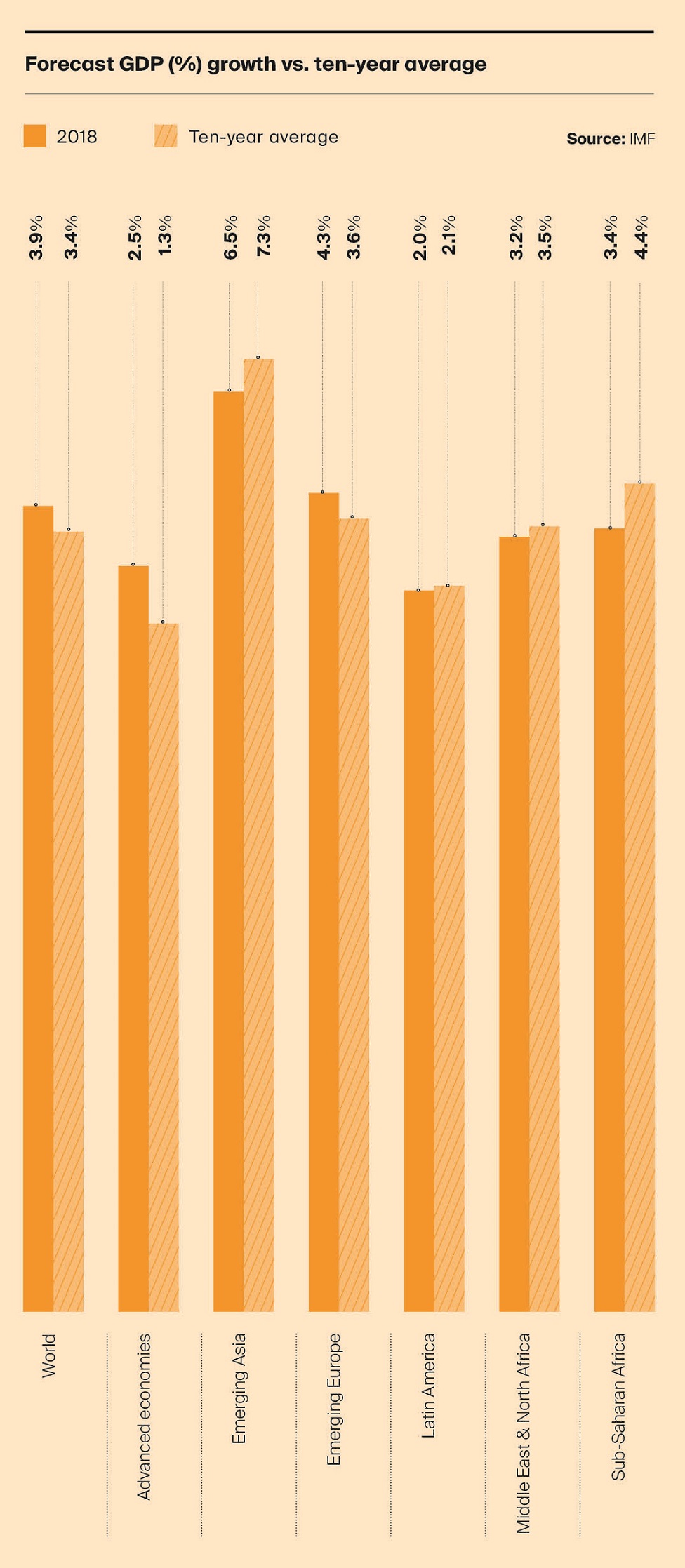_Can an improving global economy tempt investors to consider more risky real estate strategies?
Can an improving global economy tempt investors to consider more risky real estate strategies?


Intelligence
In the last decade, there have been few opportunities for economists to voice genuine optimism on the long-term outlook. However, 2018 has the sense of spring-moving-into-summer about it, with a broadly improving economy around the globe tempting investors to consider more risky strategies.
It would be wrong to assume, though, that there are no clouds on the horizon. In most advanced economies, interest rates are set to rise, although investors can mitigate the impact by targeting higher yielding assets. In short, the risks today are manageable, not systemic – creating an environment that will draw more capital into the market.
Worldwide recovery
The outlook for the global economy is for robust growth this year, with the IMF predicting that world GDP will increase by 3.9% in 2018, compared with a ten-year average figure of 3.4%. This is in line with our view that 2017 marked the start of cyclical upturn for the global economy, following a slowdown in 2015/16, when low commodity prices hit emerging markets.
"Investors might also look to cities such as London, where the market may be overestimating the level of political risk."
Growth will not, however, be spread evenly as the new cycle is at different stages around the world. Forecasts suggest that we will see huge disparities among different emerging markets. Latin America is predicted to see just 2% growth in 2018, which is less than the 2.5% figure for advanced economies.
In contrast, emerging Asia is forecast to record growth of 6.5%, as the likes of China and India continue to modernise. If you arrange the letters according to future growth prospects, rather than the BRICs we should be talking about the ICBRs.
China and India
Certainly, there is good reason for an upbeat outlook for emerging Asia. In 2017, India had to negotiate some disruptive forces, such as the withdrawal of certain banknotes and the introduction of the new Goods and Services Tax. Both will have a modernising effect in the long run, but for 2018 there is the of less disruption.
In China, President Xi has been confirmed in office, while pressure on the renminbi has eased. Moreover, both nations are making a big impact in the-growing digital economy. In some respects, and in certain regions, China appears to be overtaking the West in the latest wave of e-commerce and mobile apps.
Consequently, China and India should provide opportunities for property investors in 2018, although traditionally both markets have been dominated by domestic money.

Advanced or emerging?
However, international property investors will probably remain focused on advanced economies in 2018. Even though the IMF’s percentage growth forecast figures for the developed nations are relatively low, it is well to remember this is expansion off a high base. In total dollars, 2.5% GDP growth in the advanced economies is far more money than 6.5% for emerging Asia.
Also, more Asian money is appearing in the global cross-border property market, and usually it is seeking diversification away from the Asia-Pacific region. The advanced economies also have the attraction of higher levels of market transparency and free movement of capital.
Rates on the rise
However, the changing rate environment in the advanced economies might encourage investors to ask themselves: should we buy prime or create it, via development or asset management?
Stock markets corrected and bond yields rose in early 2018 as investors acknowledged that the era of exceptionally loose monetary policy is ending.
The US ten-year bond yield began in 2018 at 2.5% but had reached 3% by late April. There is a debate as to how quickly central banks will raise rates and to what level, but no one disputes that the long-term trajectory is upwards.
Against such a backdrop investors will probably seek higher returns, and low-yielding assets could now be viewed as less attractive, unless the buyer is seeking wealth preservation.
"The economy will deliver opportunities going forward, but investors need to go looking for them."
Attention could switch to those cities with a track record of delivering rental growth, with investors perhaps favouring multi-let buildings with a spread of upcoming lease expiries, thus offering exposure to the rental cycle. Investors might also look to cities such as London, where the market may be overestimating the level of political risk.
In summary, 2018 is a year when the global economy is on course to deliver robust growth, and this will require investors to be more proactive in their strategies.
The ride-the-yield compression period is now behind us as rates start to rise, and investors need to experiment with new markets, different locations, and develop with an eye on new occupier trends such as flexibility. The economy will deliver opportunities going forward, but investors need to go looking for them.

Our blog content is provided for interest only. It may be produced spontaneously, without the reviewing and editing often used for more formal publications. It may not be understood by a reader as it was intended. Any views expressed may be the personal view of the writer and do not necessarily reflect the view of Knight Frank LLP. It may include or be based upon information from a variety of external sources which have not been verified by us.
You read our content at your own risk and cannot rely on it in any way. To the fullest extent permitted by law, we do not accept or assume responsibility to anyone for the content or for any opinion expressed and we will have no liability for any loss or damage resulting from any use of, reliance on or reference to the content.
© Knight Frank LLP 2016. Reproduction of our content in whole or in part is not allowed without prior written approval of Knight Frank LLP to the form and context within which it appears. Knight Frank LLP is a limited liability partnership registered in England with registered number OC305934. Our registered office is 55 Baker Street, London, W1U 8AN, where you may look at a list of members’ names. Please see our [terms and conditions] and [privacy policy] for more details.
Recent News
Most Popular
Explore by Category